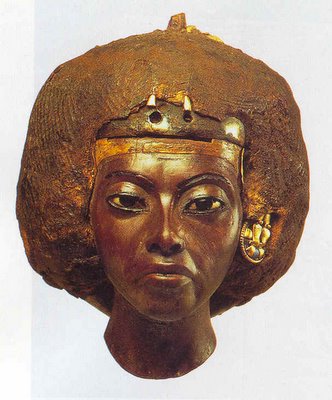
Call for Papers
"Re-educating the African in the 21st Century:
Through Balance, Peace and Justice (Ma'at)"
1st World Conference 2006
John Henrik Clarke-C.L.R. James African World Research
Institute
Aswan (Egypt)
19-25 July 2006
Historical Context:
According to John Henrik Clarke, Edward Wilmot Blyden, a
prominent Caribbean activist and a theologian from the
Virgin Islands, called for Africans all over the world to
reclaim their Africanness in 1881. Early in the twentieth
century, people of the African world were searching for a
definition of themselves and their relationship to the rest
of the world. African people in the United States of America
were still recovering from the Civil War and the subsequent
disappointment and betrayal of the Reconstruction period.
1900 witnessed the first Pan-Africanist Congress, which was
a response to Blyden's call, referred to as the African
Consciousness Movement by Caribbean activists. H. Sylvester
Williams, a young Trinidadian lawyer, was the major convener
of the first Pan-Africanist Congress in London.. He assigned
a name to the effort by calling it Pan-Africanism. At this
meeting, Williams and others concluded that the struggle in
the Caribbean, Africa and the United States of America was
basically the same, the struggle for direction and
definition.
At the first Pan-Africanist Congress and subsequent ones,
Pan-Africanists were trying to answer questions such as:
Whom do we need and who needs us? They were attempting to
regain what slavery and colonialism had taken away. In many
ways Clarke tells us that the Pan-Africanist Movement opened
the pathways for the struggle of civil rights in the United
States of America, for the federation of the islands in the
Caribbean, the end of colonialism, and for the independence
and unification of all of Africa. At later Pan-Africanist
Congresses, W.E.B Dubois, George Padmore, C.L.R. James, and
Kwame Nkrumah became the seminal voices of this Movement.
Against this backdrop, the John Henrik Clarke-C.L.R. James
African World Research Institute will host its First World
Conference. The Theme is: Re-educating the African in the
21st Century: Through Balance, Peace and Justice (Ma'at).
Nature and Scope:
What are the reviews and implications of the United Nations'
Decade for the Eradication of Poverty (1997-2006)? Further,
why is the conversation about the eradication of poverty,
the call by many African nations to eliminate huge national
debts from multi-national agencies, and the intense
spotlight on Africa critical for Africans on the continent
and in the African Diaspora?
The First World Conference hosted by the John Henrik
Clarke-C.L.R. James African World Research Institute brings
together a slate of the foremost African-descended scholars,
thinkers, artists, and activists to lead the conversation
about what this United Nations' Decade for the Eradication
of Poverty has meant for Africa and the African Diaspora.
Given the focus on Africa, what are the implications for the
re-education of Continental and Diasporic Africans beyond
2006? Participating delegates from Africa, Asia, England,
Europe, the Americas, the Pacific and the Caribbean will
have the opportunity to exchange information about the
multi-dimensional implications of this UN Decade with
respect to the re-education of African descended people
globally.
The John Henrik Clarke-C.L.R. James African World Research
Institute First World Conference in Aswan, Egypt provides
comprehensive conference facilities including a full program
of featured speakers, papers, panel presentations, small
group plenary sessions, publishing opportunities and book
exhibitions. Quality contributions for papers, panels,
posters and round table discussions, which will be double
blind reviewed, are invited.
The John Henrik Clarke-C.L.R. James African World Research
Institute First World Conference strives to balance
relevance and rigor. In pursuit of this aim, we will attract
both academics and practitioners. The presentations are
expected to be around the conference theme, as cited above.
The topics include the following: economic development in
relationship to the family, health, culture, politics,
religion, gender, intergenerational relationships, science,
and global technological strategies to connect and maintain
the global African family. It is our intention for the
presentations to be informative and set the tone for
interesting research and consulting opportunities.
Submission Instructions:
Submissions can be made in the following categories:
Completed research papers, research-in-progress papers,
panels and posters, and round table discussion papers.
Please follow the guidelines in preparing your submission.
Completed research papers: Typically 5,000 words (excluding
abstract and references)
Research-in-progress papers: Typically 2,500 words
(excluding abstract and references)
Posters and round table discussion: Typically a 1,000-word
synopsis of the topic area to be presented
Panel proposal: Typically a 1,000-word description,
identifying the panelist to be involved.
Documentary (Film/video): Typically a 500-word description
with a 20-30 minute DVD format.
Spoken Word Artist panels/performance: Typically 4-5
versatile performance pieces on preferably DVD format
In preparing your papers, please use the APA referencing
style. In text citation should be in an Author (date) format
with the bibliographical list inserted at the end of the
paper.
Submission and review process will be handled
electronically. Please make your submission as one MS Word
file. Include all figures and tables in relevant places in
the text. The title page should indicate the title, author
affiliations including, telephone number, fax and email. In
case of multiple authors, corresponding author details
should be clearly identified. The title page should also
identify the track for which you wish your paper to be
considered. All submissions will be double blind peer
reviewed. NOTE: The deadline for submission of papers has
been extended to February 15, 2006. The new Selection
Notification date is March 15, 2006.
Contact:
Dr. Clinton Crawford
John Henrik Clarke—C.L.R. James African World Research
Institute
P.O. Box 473592
New York 11247
USA
Phone: +1-718-756-8904 and 718-270-5140
Email: sankofawp@netscape.net and firstwc2006@netscape.net
Web: http://www.sankofaworldpublish
1st World Conference Call for Papers

No comments:
Post a Comment